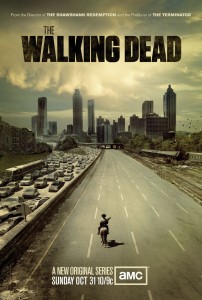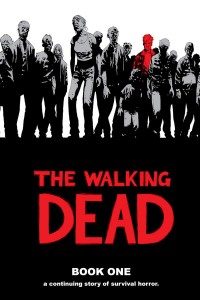The Walking Dead
 As we all prepare for the zombie apocalypse—and by this I mean the much-touted new series from AMC (the cable network that brought us Mad Men and Breaking Bad) The Walking Dead—it’s important to remember that not all zombie apocalypses are created equal.
As we all prepare for the zombie apocalypse—and by this I mean the much-touted new series from AMC (the cable network that brought us Mad Men and Breaking Bad) The Walking Dead—it’s important to remember that not all zombie apocalypses are created equal.
I, for one, have never been a huge fan of zombie tales. Zombies always feel like a one-note threat, and one that, while notoriously relentless, is both icky and not very suspenseful (they’re just not very fast.) Zombie stories of late are more silly than unnerving: Marvel Zombies (also by Walking Dead scribe Kirkman) is a ridiculous insider-joke of a series smashing together zombie movie cliches with your favorite Marvel superheroes (causing Spider-Man to exclaim the unfortunate line, “I can’t believe I ate Aunt May!”) Pride and Prejudice and Zombies created a buzz-storm by combining Austen’s wit with zombie mayhem, and doing it cleverly enough that both the wit and gore remain satisfyingly zippy.
All that shambling and moaning can be tiresome unless you’ve got a deeper story going on behind it, and that’s where the best zombie stories find their hook. Robert Kirkman’s The Walking Dead, the comics series this TV incarnation is based on, is one of those stories.
 Since the series began in 2003, graphic novel readers of diverse ages and genders have been following the series devoutly although the violence level makes it best suited to older teen and adult readers. Artists Tony Moore and Charles Adlard use black and white with gray washes to tense, evocative effect throughout these pages. The series has been a consistent bestseller for Image Comics and had ranked on the New York Times Graphic Books Best Seller Lists for 48 weeks.
Since the series began in 2003, graphic novel readers of diverse ages and genders have been following the series devoutly although the violence level makes it best suited to older teen and adult readers. Artists Tony Moore and Charles Adlard use black and white with gray washes to tense, evocative effect throughout these pages. The series has been a consistent bestseller for Image Comics and had ranked on the New York Times Graphic Books Best Seller Lists for 48 weeks.
The Walking Dead appeals to far more than comics or zombie fans in large part due to smart writing, measured pacing, and because the emotional and ethical dilemmas are kept in the foreground. When Country Sheriff Rick Grimes wakes up in a hospital with empty halls, you know it’s not a good sign. Kirkman quickly does away with the immediate questions of whether Grimes’s family has survived or how long it will take for him to find a group of survivors. The series’ drama comes from observing how his cast of characters do (or don’t) cope with the fallout from the invasion. He uses the creep of the zombie infection to its best effect, revealing the best and worst of humanity and punctuating moments of calm with gruesome reminders that humanity is no longer top of the food chain. Where would survivors ultimately go to be safe? Can civilization ever return or has it been permanently lost?
For any librarian with an adult graphic novel collection, this series should already be on your standing order list. The series up to the present storyline is available in compilations:
The Walking Dead, Book One, Image Comics, 9781582406190, $29.99
The Walking Dead, Book Two, Image Comics, 9781582406985, $29.99
The Walking Dead, Book Three, Image Comics, 9781582408255, $29.99
The Walking Dead, Book Four, Image Comics, 9781607060000, $29.99
The Walking Dead, Book Five, Image Comics, 9781607061717, $29.99
The Walking Dead, Book Six, Image Comics, 9781607063278, $29.99
You can check out the first issue online here at Newsarama.
The trailer for the series is below:


October 27th, 2010 at 10:14 am
[…] Walking Dead, the new AMC series based on the graphic novels by Robert Kirkman (see Robin Brenner’s earlier story) gets 4 of a possible 4 stars in the “TV” […]